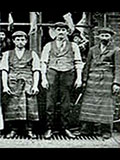- The Slaughterhouse Cases full program
- Cato Institute forum on the Slaughterhouse Cases
- The Fourteenth Amendment
- Slaughterhouses and New Orleans Sanitation
- Radical Reconstruction in Louisiana
- Crescent City Livestock Landing
- Slaughterhouse Cases at the Cabildo
- Justice Miller's Political and Legal Career
- Justice Miller's Legacy
The Slaughterhouse Cases (1873) limited the “privileges and immunities” of U.S. citizenship guaranteed by the newly enacted Fourteenth Amendment. At a time when many rights were given and regulated by states rather than the federal government, the Court’s decision applied the Amendment only to those rights explicitly spelled out in the Constitution.
In 1869, the Louisiana state legislature granted a monopoly of the New Orleans slaughtering business to a single corporation. Local butchers operating separate slaughtering businesses sued Louisiana under the Fourteenth Amendment’s Privileges and Immunities Clause. The butchers argued that the state unconstitutionally deprived them of the "privilege" of operating slaughterhouse companies and prevented them from earning a living. The Court, in a 5-4 decision, ruled that the Privileges and Immunities Clause was not violated by the monopoly. The clause only affected the rights of U.S. citizenship, not state citizenship. By designating the rights of state citizens as beyond federal protection, this decision opened the door for Jim Crow laws in the post-Reconstruction South.

The Butchers’ Benevolent Association, led by founding president Paul Esteben, was a group of New Orleans butchers who sued Louisiana and the Crescent City Livestock Landing and Slaughterhouse Company over a Louisiana statute granting the company a monopoly to slaughter all animals in New Orleans.

Samuel Miller (April 5, 1816 – October 13, 1890) was the Supreme Court justice (1862 – 1890) who wrote the majority opinion in Slaughterhouse. He was appointed by Abraham Lincoln and supported the abolition of slavery so much that before the War, he moved from his home state of Kentucky to Iowa, a free state.

Stephen Field (November 4, 1816 – April 9, 1899) was a Supreme Court justice (1863 – 1897) who wrote a dissent in Slaughterhouse arguing for a much broader reading of the Fourteenth Amendment. Field’s opinion is much closer to modern legal interpretations of the amendment.




